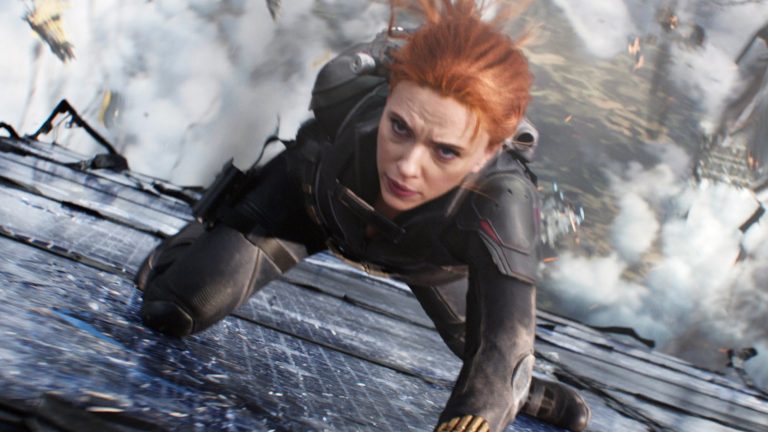In Black Widow, It’s Easy to Forget Natasha Doesn’t Have Powers
Black Widow almost delves into an exploration of Natasha's heroism as a non-superpowered hero... and then doesn't.

This Black Widow article contains MAJOR spoilers for the film.
The Marvel Cinematic Universe plays fast and loose with the laws of physics, often opting to create its own logic when it comes to the properties of space and time. Nowhere is this more true than in the MCU’s depiction of the effects of physical trauma on the human body. It’s easier to dismiss the lack of bodily consequence when someone like Captain America survives a massive explosion—after all, we don’t have any super serum-ed up individuals in our real world with which to compare.
This isn’t the case with a character like Natasha Romanov, however. In Black Widow, like MCU installments before it, Natasha improbably walks away from some serious blows. So much so, that it’s easy to forget that the character doesn’t, you know, actually have any superpowers.
Does Black Widow Have Superpowers?
Black Widow pretty much plays by Batman rules, which is a fancy way of saying: no, Natasha Romanov doesn’t have any superpowers. According to Marvel HQ, Black Widow’s abilities include: being a “master in the covert arts of espionage, infiltration, and subterfuge,” an “expert martial artists, with exceptional agility and athletic ability,” and someone who “utilizes advanced weaponry including custom stun batons & ‘Widow’s Bite’ bracelets capable of stunning enemies with electrical discharges.” Basically, she’s a super-spy.
Interestingly, the only Black Widow main character with superpowers is Alexei, aka Red Guardian. Natasha’s dad-figure has super serum-created advanced strength and speed, both of which he demonstrates in the film, most effectively in the opening sequence when he casually flips a truck to clear the way for the spy family’s escape plane. Red Guardian is situated as the Soviet’s answer to Captain America, a status that is played for laughs in Black Widow, along with much of Alexei’s modern-day storyline. When Alexei sees Natasha for the first time in decades following his rescue from a Siberian prison, Alexei immediately asks her if Steve Rogers has mentioned him.
The rest of Natasha’s surrogate family is similar to Natasha in terms of capability. Neither Yelena nor Melina have superpowers but learned their abilities in the Red Room, the brutal brainwashing and conditioning program that creates Widows. We see the effect violence has on their bodies, though in a superhero movie kind of way that means these characters are never seriously injured.
In superhero and other kinds of action movies, we rarely see characters properly having to recover from an injury or deal with a chronic disability brought on by their physically traumatic lifestyle. In Black Widow, this looks like Melina limping up to her daughters after the climatic fight, turning her physical pain into a joke, as is the MCU way. In superhero movies, characters are either alive and kicking, or they are dead. There is very little honest depiction of the in-between.
Playing By Action Movie Rules
I’m more than willing to play by Action Movie Rules when it comes to Black Widow, and to ignore the fact that, if this were the real world, Natasha would be down for the count after the first fight in this movie, let alone the last. We don’t watch superhero movies for their realism.
However, rather than committing to this convention of the genre, Black Widow explicitly brings up Natasha’s relative vulnerability in comparison to most of the other Avengers. While Yelena and Nastasha are recovering after their fight in Budapest, we get this quip from Yelena: “I don’t think the god from space has to take an ibuprofen after a fight.” It’s actually an incredibly interesting point for Black Widow to make, however, it never comes up again.
All the Avengers risk something when they show up to a fight, but the stakes have always been much higher for characters like Natasha or Clint, who have a real chance of getting killed whenever they put their body on the line, as compared to Thor, Steve Rogers, or even Tony Stark, who is almost always swathed in a protective suit. It’s the kind of throwaway comment I would have liked to see turn into more of a thematic discussion in a film that is a deep dive into Natasha’s motivations and heroism, especially when those of us who have seen the events of Avengers: Endgame play out know how fragile Natasha’s life truly is and how much she will inevitably sacrifice to save the world.
